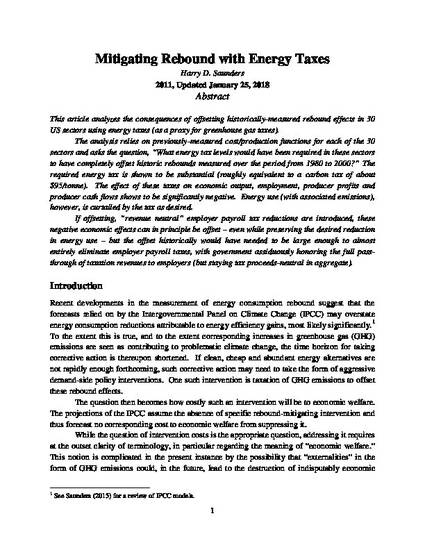
Unpublished Paper
Mitigating Rebound with Energy Taxes 1-25-18.pdf
(2011)
Abstract
This article analyzes the consequences of offsetting historically-measured rebound effects in 30 US sectors using energy taxes (as a proxy for greenhouse gas taxes).
The analysis relies on previously-measured cost/production functions for each of the 30 sectors and asks the question, “What energy tax levels would have been required in these sectors to have completely offset historic rebounds measured over the period from 1980 to 2000?” The required energy tax is shown to be substantial (roughly equivalent to a carbon tax of about $95/tonne). The effect of these taxes on economic output, employment, producer profits and producer cash flows shows to be significantly negative. Energy use (with associated emissions), however, is curtailed by the tax as desired.
If offsetting, “revenue neutral” employer payroll tax reductions are introduced, these negative economic effects can in principle be offset – even while preserving the desired reduction in energy use – but the offset historically would have needed to be large enough to almost entirely eliminate employer payroll taxes, with government assiduously honoring the full pass-through of taxation revenues to employers (but staying tax proceeds-neutral in aggregate).
Keywords
- Rebound,
- Carbon Tax,
- Mitigating Rebound,
- Rebound Mitigation
Disciplines
Publication Date
April, 2011
Citation Information
Harry D. Saunders. "Mitigating Rebound with Energy Taxes" (2011/2018)
Available at: http://works.bepress.com/harry_saunders/28/
